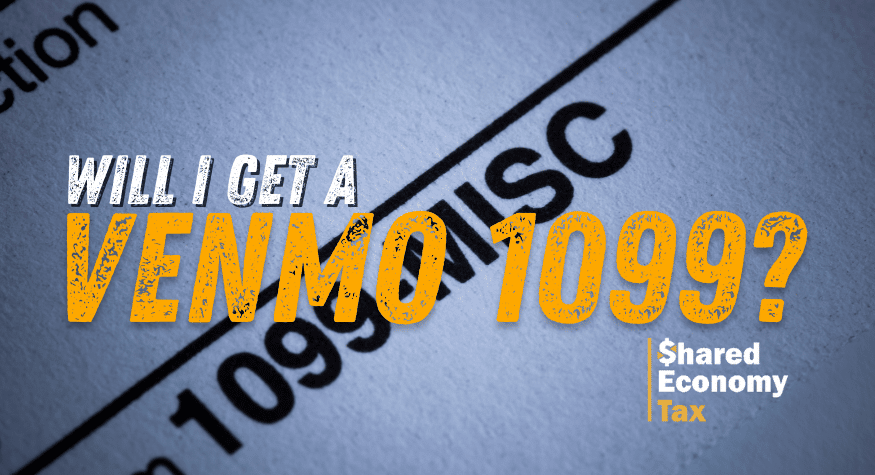Remote work has produced an influx of 1099 independent contractors, and the IRS updated its rules in 2022 to ensure everyone pays their fair share of taxes. As a result of the new rules, many more people will get a Venmo 1099 in 2024. This was originally to be implemented in January 2023, but there was pushback from the industry, and the IRS postponed the implementation date to 2024.
So, starting on January 31, 2024, payment processors like Paypal and Venmo will expand their reporting guidelines to comply with the new regulations. So, should you expect a Venmo 1099 next year? Read this article to find out.
New IRS Guidelines for Venmo 1099 Forms
Prior to 2023, Venmo only had to send 1099-K forms to users who received $20,000 or more AND made more than 200 transactions. If a seller didn’t meet both of these requirements, they probably didn’t receive a 1099-K from from Venmo.
However, it’s all going to change in 2023. Now, regulations require Venmo to issue a 1099-K form for anyone who receives $600 or more through business use of the platform.
Other third-party payment processors like Airbnb, PayPal, and Upwork must also follow the new requirements.
However, the $600 threshold applies to each platform separately. So, if you had $400 of transactions on Venmo and $400 on Paypal, you won’t receive a 1099-K from either platform.
Will I Get a Venmo 1099 for 2022?
If you’ve received more than $600 for selling goods or services through Venmo, you will probably receive a 1099-K form.
Most businesses generate more than $600 per year in revenues, so most people who use Venmo for business will likely receive a 1099 form.
However, Venmo has the option to issue forms for people who received less than $600, so you might receive one even if you don’t meet the criteria.
The $600 threshold only applies to business transactions. The new regulations DO NOT cover money sent for personal purposes.
If you’re expecting a tax from Venmo and don’t get one, you should follow up. If they sent one, you could have IRS problems for any discrepancies between their totals and yours.
What are the Tax Implications of a Venmo 1099-K?
Unlike other 1099 forms, A 1099-K declares income related to a payment processing platform. However, like any 1099, you must report the totals on your tax return. Entities should report 1099-K income on their business returns, and pass-through organizations or sole proprietorships should declare it on their personal returns
Report the exact totals listed on your 1099 on your tax return. If your numbers don’t match the 1099 form, reach out to Venmo to request a corrected 1099-K. If the totals on your 1099 don’t match your return, expect to hear from the IRS.
The new regulations give the IRS the power to request all information about transactions on Venmo, Airbnb, and other payment processor accounts when conducting an audit. The IRS can also subpoena your digital records if you do not comply with audit information requests.
The Tech Industry is Pushing Back
Many Venmo users are unhappy about the new regulations, but payment processing companies don’t like the change either.
Venmo’s parent company, PayPal, and other payment processors launched 1099K Fairness.org to raise public awareness about the issue.
These companies say they don’t want to store personally identifiable tax data because of the potential liability risk. However, the IRS requires processors to collect this info already, so regulators moved forward with the change.
Check out their website to learn more about the argument against the new 1099 rules.
Is There Any Way to Avoid a Venmo 1099?
The only way to legally avoid a 1099-K from Venmo is to process less than $600 of business payments through the platform. Payments marked as friends and family transactions will be subject to close scrutinization in the event of an audit.
Virtually all payment processors are affected by these new rules, so you will likely receive a 1099 form no matter which one you use. So there is little reason to change to a new processor if you are trying to avoid tax reporting.
The one possible exemption to the requirement is Zelle. Zelle allows banks to transfer money directly between each other. Note that Zelle has lower daily transaction limits than other platforms. Below is the explanation of Zelle’s exemption from the 1099-K reporting requirement.
“Zelle facilitates messaging between financial institutions but does not hold accounts or handle settlement of funds, which does not make them an institution that holds SSNs and Employer Identification Numbers (EINs) for individuals and businesses conducting business related to goods and services.”
Note that you may not receive a 1099-K from Zelle, but you are still required to report your income to the IRS. However, using Zelle will minimize the number of 1099s you use Zelle for your transactions.
Closing Thoughts
The new reporting requirements may seem intrusive, but they don’t change anything for taxpayers. You must report all of your income on your tax returns, regardless of whether you receive a 1099 for it or not.
However, you should still verify the totals on your 1099-K match what you report to the IRS. Any discrepancies could result in an IRS inquiry or much worse.
Report your income accurately to ensure you stay compliant and avoid IRS penalties. In the event of an audit, the IRS will request transaction reports from all payment processors you use, along with bank statements to verify your deposits.
Shared Economy Tax specialized in accounting services for independent contractors. If you have more questions about the new 1099 rules, set up a one-on-one strategy session with one of our veteran tax experts today!
